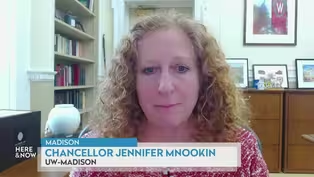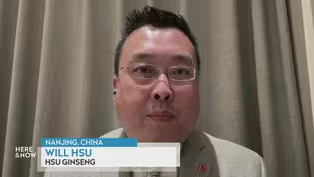Here and Now
Mike Totoraitis on Lead Contamination in Milwaukee Schools
Clip: Season 2300 Episode 2340 | 6m 7sVideo has Closed Captions
Mike Totoraitis on efforts to remediate lead paint contamination in Milwaukee schools.
Milwaukee Commissioner of Health Mike Totoraitis discusses city efforts to remediate lead paint contamination in schools as the Trump administration defunds CDC staff working to reduce lead exposure.
Problems playing video? | Closed Captioning Feedback
Problems playing video? | Closed Captioning Feedback
Here and Now is a local public television program presented by PBS Wisconsin
Here and Now
Mike Totoraitis on Lead Contamination in Milwaukee Schools
Clip: Season 2300 Episode 2340 | 6m 7sVideo has Closed Captions
Milwaukee Commissioner of Health Mike Totoraitis discusses city efforts to remediate lead paint contamination in schools as the Trump administration defunds CDC staff working to reduce lead exposure.
Problems playing video? | Closed Captioning Feedback
How to Watch Here and Now
Here and Now is available to stream on pbs.org and the free PBS App, available on iPhone, Apple TV, Android TV, Android smartphones, Amazon Fire TV, Amazon Fire Tablet, Roku, Samsung Smart TV, and Vizio.
Providing Support for PBS.org
Learn Moreabout PBS online sponsorshipmuch.
>> Thank you for having me.
>> As we reported last week, the city of Milwaukee and its health department are in crisis mode right now, trying to clean public schools of lead contamination.
Lead that's resulted in the closure of schools as mitigation to remove flaking lead paint and lead dust from children's classrooms proceeds.
And now the CDC has alerted Milwaukee that it cannot help because federal cuts have eliminated its lead program.
We sat down with Milwaukee Health Commissioner Mike Totoraitis for more on all of this.
How big of a public health emergency is this?
>> It is certainly a crisis.
We, as you know, the district has around 68,000 students district wide and over 100 buildings that were built before 1978.
When we started our investigation in January, it was concerning to see the kind of systemic issues of maintenance that did not maintain the lead painted surfaces.
And, you know, the cleaning practices that left a lot of lead dust present in the classroom.
So given the number of buildings and the number of students in these buildings, we were extremely concerned about what was happening.
>> So could a public health emergency be declared?
>> Yes.
And generally we use those designations when there's immediate legal action that has to happen that normally in my role as a health officer for the city, you know, I am charged with protecting the health and safety of our residents and guests of the city.
At the same time.
I have a lot of authority under state and local ordinance to protect the health of everyone, and in this case, declaring an emergency wouldn't have afforded me any different authority to say, close a school or to require testing of students.
The other really important part is an emergency declaration doesn't actually release any funds.
So there aren't there isn't like a pot of $1 million just waiting to be tapped for this moment.
And thankfully, we've been very fortunate in, you know, these are mandated services that we provide as a department is investigating lead hazards here to do this work.
We're thinking about long term ways to do that.
But.
At this point, we're not going to declare one.
>> How did it happen that schools weren't made safe from lead?
>> We uncovered that the district wasn't following their lead maintenance plan.
So it's a plan that the district has created that outlines what they will do on an annual basis to ensure lead safe schools and classrooms where the students are through our investigation, based on the level of paint degradation and the level of dust that was identified through our investigation, we've determined that this wasn't something that happened overnight.
This was, you know, years in the making of the facilities not being maintained.
And now we're at this stage where there's significant lead hazards present.
For the students and staff.
>> But meanwhile, you're now told that the CDC cannot help you because of federal budget cuts that eliminated its lead program.
Where does that leave Milwaukee?
>> It's, you know, a kind of a similar space of trying to navigate the uncertainty.
You know, we were really floored to receive that notification that the team that we had been working with since the beginning of the year on their childhood lead team for the CDC, the nation's top lead experts, were let go across the CDC, the HHS eliminated, you know, you know, several thousand people, including the childhood lead team.
Really unprecedented time for the health of our country, and particularly here in Milwaukee as we deal with this crisis.
We had planned to have these experts help us validate what we were already doing, and they were going to bring additional expertise to the epidemiologic investigation and to was the child poisoned at their home?
Were they poisoned in the schools?
As we screened more children.
>> Will all the schools be inspected?
>> Yep.
So the plan right now, I think it's roughly 100 schools.
Essentially, we created a prioritization list based on age of school, the age of the students in the school.
You know, recent renovations, those kinds of things to help rank what schools needed to get inspected.
Quickly and which schools are newer and might not have any lead hazards present.
So that plan hopefully actually will be released either today or on Monday.
And then parents can have a general sense of when their school might be closed, as they do renovations and stabilization work, or if they're going to close part of the school, only to do.
Renovation and stabilization.
But the district has a mandate to ensure healthy and safe schools across the entire district.
And we're here to enforce that.
And really help the district equip themselves with a sustainable plan to manage all of their buildings.
>> What about the children?
Will they all be tested?
>> That's our recommendation to the district.
So we are working with them to put a testing plan in place.
I think the part I would reiterate is that parents can find out right now if their kid has been poisoned.
So whether they're working with their primary care provider or their pediatrician, that screening data will tell you right away as we work with the district, to have them return to compliance.
One of the ways that we feel is warranted at this point is to require the district to screen the children.
>> What is your message to citizens and parents and students and teachers in this city on all of this?
>> Continue to ask the questions as the district releases their plan with the timeline for future closures and future work.
Parents should refer back to that plan as well, and continue to ask the district additional questions about progress made and other updates that might be relevant to the learning experience of students here in experience of students here in
Chancellor Jennifer Mnookin on 2025 Headwinds for UW-Madison
Video has Closed Captions
Clip: S2300 Ep2340 | 12m 13s | Jennifer Mnookin on Trump administration moves to cut funding and revoke student visas. (12m 13s)
Here & Now opening for April 18, 2025
Video has Closed Captions
Clip: S2300 Ep2340 | 1m 4s | The introduction to the April 18, 2025 episode of Here & Now. (1m 4s)
Thanh Bui-Duquette on the Proposed Elimination of Head Start
Video has Closed Captions
Clip: S2300 Ep2340 | 5m 57s | Thanh Bui-Duquette on how defunding Head Start could affect child care in Wisconsin. (5m 57s)
Will Hsu on Wisconsin Ginseng Exports, Tariffs and Trade War
Video has Closed Captions
Clip: S2300 Ep2340 | 5m 33s | Will Hsu on retaliatory tariffs by China affecting the Wausau-based ginseng business. (5m 33s)
Providing Support for PBS.org
Learn Moreabout PBS online sponsorshipSupport for PBS provided by:
Here and Now is a local public television program presented by PBS Wisconsin















